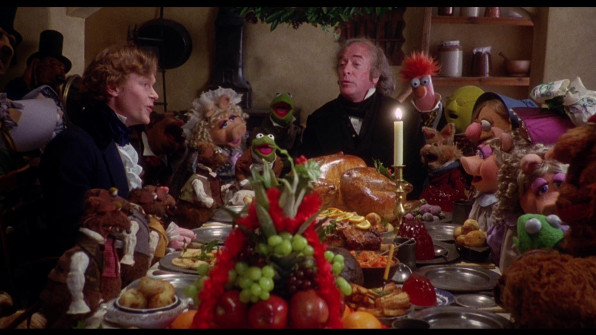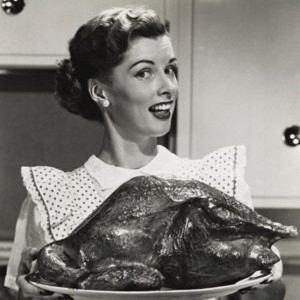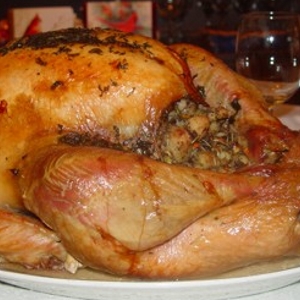Folks often joke that their big family feasts usually end with half the crowd lounging in front of the TV pretending to watch some kind of team sport and the other half unapologetically zonked out in a postprandial nap. And the phenomenon is particularly pronounced when Turkey is served…
 We’re more comfortable eating more when dining with family and friends…
We’re more comfortable eating more when dining with family and friends…
Turkey, of course, is known to be rich in tryptophan, an amino acid which is a key building block of serotonin, which in turn tells the brain to sleep. Well, it’s not quite that simple, but you get the drift.
My theory about after dinner napping is that simply eating more than usual causes blood to collect in the abdomen, where digestion takes place, because there’s a big job to do, and that deprives the brain of the energy it needs to remain sharp and alert. Doctors say that’s a load of… something unpleasant, though.
Nevertheless, scientists insist we do eat more – much more – when dining with friends and family than we do when dining alone. And the reasons they’ve postulated for that are kind of interesting.
What they did
Feasting with friends and family is known, scientifically, as ‘social dining’. And researchers at the University of Birmingham in the UK wanted to analyse the causes and effects of eating socially on the average person.
So, they data-mined 42 existing studies on the phenomenon and came up with some pretty extreme findings…
What they found
Turns out that, on average, those eating with others consumed up to 48 percent more food than solo diners. Why?
The researchers say it may all go back to ancestral memories and survival habits. They explain that ancient hunter gatherers shared food because it protected against periods of food insecurity. This survival mechanism may still persist today, leading to people eating more with friends and family because:
- Eating with others is more enjoyable, and enhanced reward from social eating could increase consumption.
- Social norms might ‘permit’ overeating in company but sanction it when eating alone.
- Providing food becomes associated with praise and recognition from friends and family, strengthening social bonds.
The takeaway
“What we describe as ‘social facilitation’ can be seen as a natural by-product of social food sharing – a strategy that would have served a critical function in our ancestral environments. This also explains why it is more likely to occur in groups with individuals who are familiar with each other,” says Study Leader Dr. Helen Ruddock. But she also notes that the social facilitation effect on eating was not observed across studies which had looked at food intake among people who were not well acquainted.
“Findings from previous research suggest that we often choose what (and how much) to eat based on the type of impression that we want to convey about ourselves,” Ruddock postulates. “Evidence suggests that this may be particularly pronounced for women eating with men they wish to impress and for people with obesity who wish to avoid being judged for overeating.”
Jeepers, Doc! You don’t have to have a PhD to figure that one out.
My take
 My mom always used to whisper to me, just before we sat down to a big extended family feast at someone else’s house, “Eat lots! Show Grandma you love her cooking. She went to a lot of trouble to make this for us!” Likewise, when we were hosting a big family feast at our house, mom would whisper, both to me and dad, ‘F.G.E.!’ Which was code for ‘Family Go Easy’, or, ‘don’t be a pig in front of the company; make sure everybody else gets enough’.
My mom always used to whisper to me, just before we sat down to a big extended family feast at someone else’s house, “Eat lots! Show Grandma you love her cooking. She went to a lot of trouble to make this for us!” Likewise, when we were hosting a big family feast at our house, mom would whisper, both to me and dad, ‘F.G.E.!’ Which was code for ‘Family Go Easy’, or, ‘don’t be a pig in front of the company; make sure everybody else gets enough’.
Somewhere, Dr. Obvious is chuckling away over his third plate of Turkey and Stuffing.
~ Maggie J.

